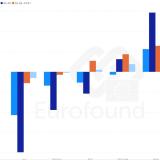
Empleo y mercados laborales
El empleo y los mercados laborales son uno de los seis ámbitos de actividad principales del programa de trabajo de Eurofound para el período 2021-2024. Eurofound seguirá funcionando como centro de conocimientos especializados para el seguimiento y el análisis de la evolución del mercado laboral, sobre todo teniendo en cuenta que los mercados laborales europeos tienen ante sí importantes retos tras la pandemia de COVID-19. La recopilación de datos y la investigación se centrarán en las consecuencias de la pandemia en el trabajo y el empleo y en la manera de mantener el funcionamiento y el carácter inclusivo del mercado laboral.
Durante el período 2021-2024, la investigación de Eurofound proporcionará información importante sobre los retos y las perspectivas en el ámbito del empleo y los mercados laborales en la UE. Eurofound desempeña un papel importante en el seguimiento de las tendencias del mercado laboral, así como en la supervisión de las repercusiones de estas tendencias para distintos grupos de trabajadores.
La investigación se centrará, en general, en la estructura cambiante del mercado laboral utilizando los instrumentos de seguimiento consolidados de Eurofound, el Observatorio Europeo del Empleo (EJM) y el Observatorio Europeo de la Reestructuración (ERM), además de los datos de Eurostat. Con los elevados niveles de desempleo previstos en algunos países, regiones, sectores y ocupaciones, que afectan también a los trabajadores más precarios y vulnerables, estos instrumentos ayudarán a detectar sectores, ocupaciones y cualificaciones en crecimiento y en declive. El ERM también seguirá examinando las reestructuraciones a gran escala, los instrumentos legislativos y de apoyo, así como las medidas desarrolladas por los interlocutores sociales y las autoridades públicas para ayudar a los trabajadores a transitar entre empleos o sectores.
Eurofound se centrará asimismo en la escasez de mano de obra y en la infrautilización de recursos humanos y talento en determinados sectores y ocupaciones, acentuados durante la pandemia de COVID-19, estudiando intervenciones políticas y prácticas empresariales. Entre los temas específicos figurarán la inadecuación de las capacidades , la jornada laboral , la movilidad geográfica o profesional y la integración de los migrantes , así como los grupos infrarrepresentados en el mercado laboral, como los jóvenes, las mujeres y las personas con discapacidad . Eurofound también examinará los sectores tradicionalmente afectados por la escasez de mano de obra, un problema cada vez más acuciante debido a la pandemia. Esta actividad se tendrá en cuenta en el trabajo preparatorio de la próxima edición de la Encuesta Europea de Empresas (ECS) .
La colaboración de Eurofound con el Centro Común de Investigación (CCI) de la Comisión Europea también proseguirá en este ámbito. La investigación sobre reestructuración contribuirá a las actividades del Fondo Europeo de Adaptación a la Globalización (FEAG) y del Fondo Social Europeo Plus (FSE+). Se explorarán los vínculos con la agencia hermana Cedefop y la Autoridad Laboral Europea en lo que respecta a las cualificaciones y a la movilidad laboral en el contexto de las políticas de empleo dirigidas a remediar la escasez de mano de obra.
- Infografía: Empleo y mercados laborales en la UE







































